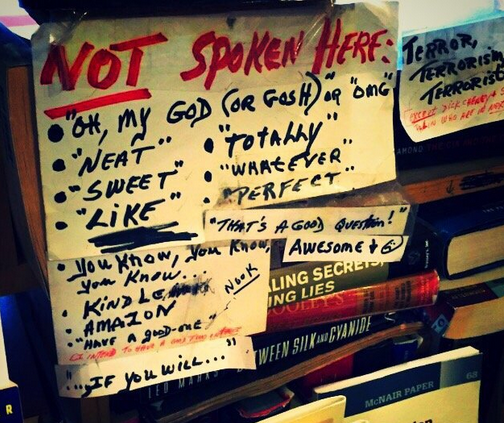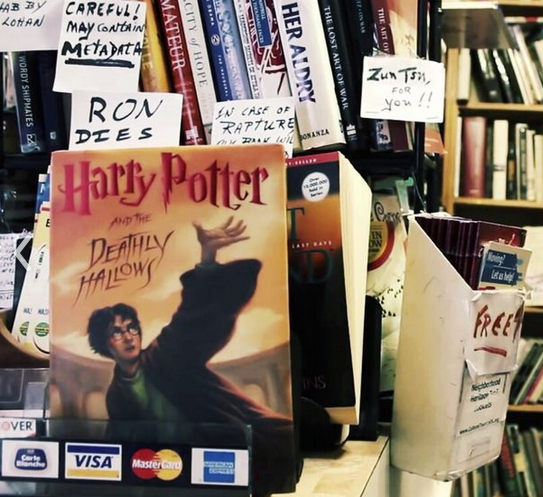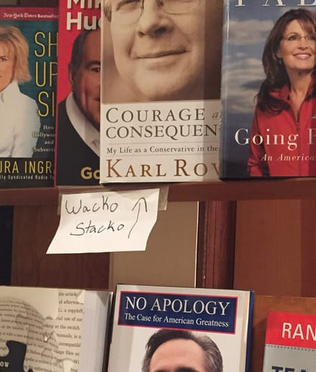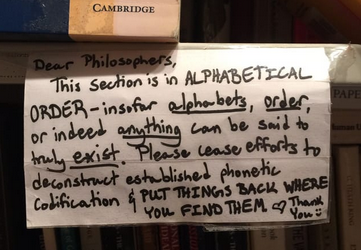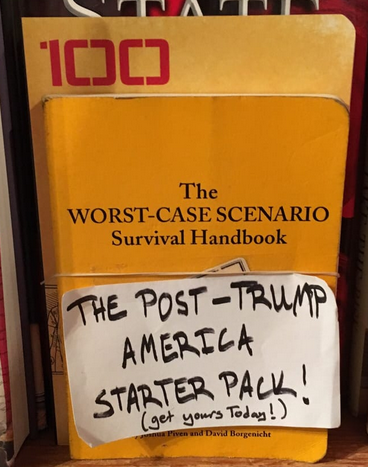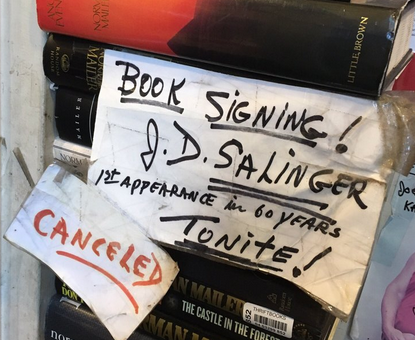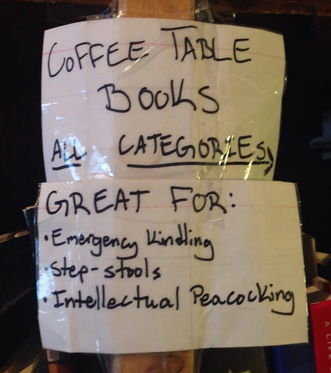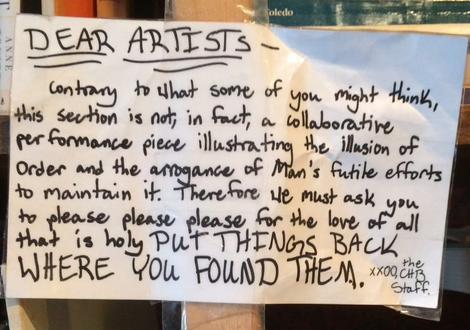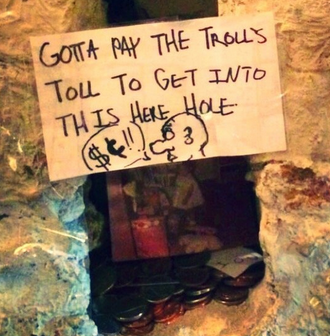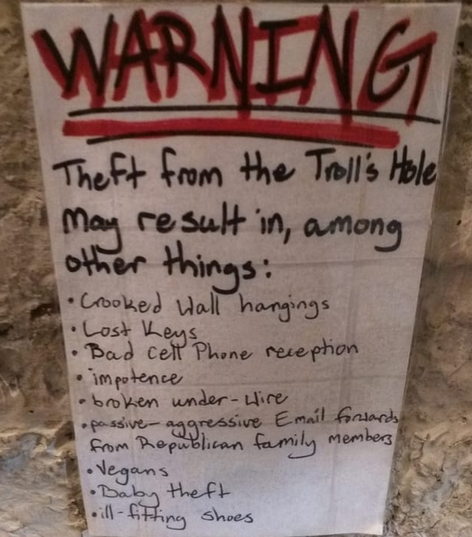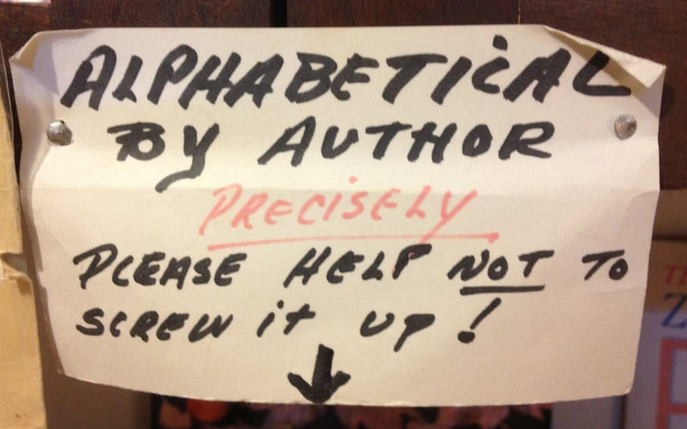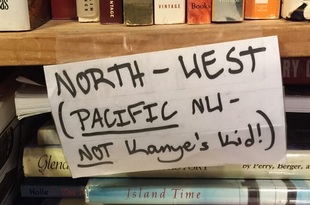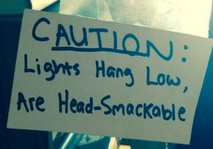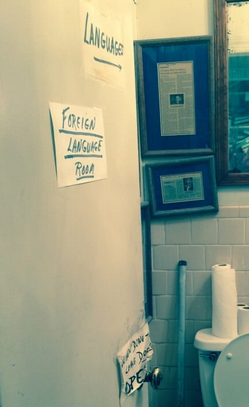Jim Toole has owned DC's Capitol Hill Books for 23 years, and while his three-story, secondhand bookstore has been named one of America's "10 Beautiful Bookshops for Bibliophiles" and "10 Best Bookstores in DC," Toole has earned a title as well: "DC's Most Curmudgeonly Store Owner."
In honor of AWP 2017, February's TRAVEL BY BOOKSTORE is going to Washington. Take an advance tour of one of our capital's literary landmarks here, but when you visit in person, please, be sure to read the signs.
Before we get started, I know you have some rules, both for the bookstore and for conversation in general. I want to make sure I’m clear on the blacklist.
Yes, because I’m suffering brain damage from hearing the same thing over and over again.
The annotated list of words and phrases prohibited in Capitol Hill books is as follows:
"OMG, oh my god, ohmigod" etc.
"Neat," "sweet," "like-like-like," "you know?"
"It’s like ______" (Either it is or it isn’t)
"If you will..." (No, I won’t)
"Kindle," "Amazon," and "Nook" (Because they're going to put me out of business)
"Totally," "whatever."
"Have a good one!" (No, I think I’ll have two, thank you very much)
And recently a veritable epidemic of “Perfect” and “Awesome” ("Where is the fiction section?" "Upstairs." "Perfect!”)
I just can’t take it.
Anything else?
Lastly, upon entering, there’s a sign that says “This is a bookstore, not a phone booth.” Because I object to the noise and bother of having a bunch of different conversations going on in the store, especially when I can’t hear the other side of them.
Have you read the Washingtonian piece about me? They called me a curmudgeon.
And how did that sit with you?
I mean, they’re probably right. You can read it. Tell me what you think.
How did Capitol Hill Books get started?
In the early 1990's a former priest lived upstairs in the building that's now Capitol Hill Books, and downstairs there was a real estate merchant. Bill Kerr, the founder, was working in a used bookstore down the street, but wanted to start is own. That other bookstore paid him in books, and so he began collecting them. When that bookstore moved to Maine, Bill rented this space from the retired real estate guy who owned the building and turned one room of the downstairs into the shop. He lived upstairs.
Unfortunately, in 1994, Bill died in his bedroom. That room is now the Mystery Room.
And you took over and expanded?
I bought the rights to the store from his sister.
I’d been writing grants for organizations that wanted to eat from the federal trough, but I was tired of working for other people and wanted to try working for myself.
First, I expanded the first floor, filling up the three rooms, and even the bathroom and closet with books. Want to know what type of books I put in the bathroom?
What type of books?
Foreign language books. Want to know why?
Why?
Because in the United States, foreign languages are in the toilet. There are shelves in there and everything. I stuff all the business books in the closet since they’re pretty much useless from the moment they’re printed. And then the kitchen is where the cookbooks are.
Next I took on the second floor. Bill’s old living area up there is all Fiction. Then the converted upstairs kitchen is music and poetry, also essays and literary criticism. The upstairs bathroom is now a computer room, where I pay a woman to come in and post some of the books I find at estate sales and auctions online, at abebooks.com—so that people can find and buy them, and not just come into the store to stroke them and decrease their value.
How long did the expansion take?
I filled the first floor in '95, then the upstairs in '96 and '97, then started work on the basement. So with three full floors of books we could more or less keep our head above water.
Then the owner of the building went and died in 2004, and his people tried to kick me and my 30,000 books out on the street. So then I had to do something I didn’t at all want to do.
What was that?
I had to go around and ask for money. I spent three months apologizing to people and getting them to give me enough money to buy the building.
What is your sense of the current outlook for independent bookstores? Recently, at least in some cities, things seem to be looking up. How are things on the Hill?
What gets mixed up in all this talk is that there are two types of "independent" bookstores. There are the bookstores, many of them called independent (not Barnes & Noble etc.), that sell new books, where the publishers come in and fill up their shelves with their shiny new products, and even if they don’t sell, they’ll take them away and give them MORE new products. So they’ve got a pretty nice arrangement, and from what I hear, they’re doing quite well.
But that’s all very different for us USED bookstores. The publishers don’t care about used books, so I have to sell them at half price or lower. Meanwhile people are bringing in crap to sell me, and looking to make perfectly good money on their crap. So then I have to run around like a stripe-assed pig looking for quality used books to sell.
Luckily, dead people can’t take their books with them, so I find lot of high quality classics at estate sales and book auctions. What I’m doing is recycling.
So the new bookstores, they’re not really independent—they’re dependent on publishers. I'm independent—I have to hustle. So when people say indie bookstores are doing better, they’re not really talking about the mom and pop curmudgeons selling used books. No, we’re still struggling and going out of business like before.
There’s also the problem of the internet. I have to find the books to sell you, but I also have this brick and mortar establishment—electricity and water and heating systems blowing up, all those bills—but your generation, even if you’re interested in used books, you can just buy or sell the book online. And that guy who runs Amazon? Saying he’ll digitize every book that’s ever been published? That too, hurts used books.
The trouble is, your generation is obsessed with its screens. And even if you still like picking up a book, then it'll be your kids. They'll be even more obsessed with their goofy screens.
You’re bad enough, but it’s going to be worse.
How do you help people navigate the store? Obviously, there are a lot of signs. Do you also provide recommendations? Staff picks?
No. I don’t do that anymore. People kept coming back and complaining: “What the hell, how could you think I would’ve liked that piece of crap?”
It’s like buying art for someone else. I don’t don’t even attempt it anymore.
We’re located across from Eastern Market, the oldest fresh food market in the city, and on Saturdays and Sundays there’s a flea market. I’m just like one of those little tents in the flea market—people come in here after they’ve browsed out there. So my clientele is really "Joe Everyman," usually not people looking for antiquarian stuff or particular titles. So I have to have the full spectrum available for whoever might wander in. My clientele is 90% new, and 10% return customers and friends of return customers.
So you sell a little bit of everything?
Where I draw line is romance novels. Those don’t come in the door.
Also things that don’t sell. Like hardcover mysteries. The NYT bestellers list would have you believe every new Patterson hardcover will sell like hotcakes, but when it comes to used books, people want a mystery they can read on a train and leave in a lobby. No, I give hardcover mysteries away free on the sidewalk. But I do sell a lot of paperback mysteries.
As for fiction, that rules doesn’t apply. People buy good fiction in whatever form.
What are your bestsellers? Things you're always selling out of and looking to acquire?
Salinger, Vonnegut, Steinbeck, Hemingway, Coelho, and Camus (people read a lot of Camus). Girls read a lot of Austen. And an incredible amount of Faulkner, Fitzgerald, and Garcia Marquez. Lolita I pick up whenever I see it. One thing that never stays on the shelf for more than fifteen minutes is a Murakami novel. And then we sell a lot of Ayn Rand to the Republicans.
Now that you mention it, have you seen an uptick in the sale of any particular books or genres in the wake of the election?
Not yet, though people do tend to buy The Art of the Deal and How to Win Friends and Influence People when they see them on the shelves.
What I can tell you is that when Bush left and the Obama people came in, they brought lots of intellectuals. Lots of people buying better books. With Obama there were also suddenly a lot guys coming in looking for philosophy and literary fiction, the good stuff. Under Bush it was mostly women buying books, and the men would come in and pose. But that changed.
Do you hold any regular events? Will you be hosting for AWP?
We hold several regular events, though you missed last Friday's when we did an event with the Shakespeare Theater Company on Hemingway. They're putting on The Sun Also Rises. We did that with Riverby Books, the other Capitol Hill bookstore. They're a little more sophisticated over there—they've got some rare and antiquarian stuff. Also tea and cookies.
Every second Saturday of the month from 4-7PM we do free wine and cheese. And the whole store is 10% off. That'll be on the 10th. Just don't show up at 10AM expecting free wine (AWP attendees take note).
Then we have a guy who makes beer, and when he makes a new batch, we have a Bookstore Brew event with two free kegs. That's a good one.
Okay, is that all? Or are you going to keep bugging me?
Want to learn more?
Follow Capitol Hill Books on Facebook and Twitter.
657 C Street SE, Washington, DC 20003 / (202) 544-1621

